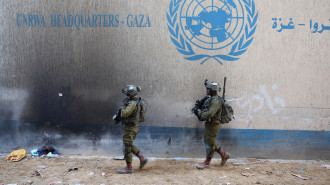Follow him on Twitter: @pauliddon
Who will Kurds support in Iraq's upcoming elections?
After months of strained ties between the Iraqi central government and the autonomous Iraqi Kurdistan region it remains unclear who the Kurds will support in the upcoming May elections in the country.
Following the independence referendum in Iraqi Kurdistan, Baghdad swiftly responded by shutting the region's airspace to international flights, a flight ban that the Kurdish leadership described as "collective punishment" against the Kurdish people.
The ban persisted until this month, after the Kurds agreed to have the airports placed under federal government control. Baghdad also sent its military to take over the entire province of Kirkuk - the status of which is legally disputed under the constitution, in October.
In early March, Iraq reduced the Kurds' share of the Iraqi budget from 17 percent to 12.6 percent. The Kurds boycotted the budget session, but Shia and Sunni groups went ahead and approved the new budget anyway, which Kurdistan's former president Masoud Barzani called "a clear violation of the principle of partnership".
This move was unprecedented in post-2003 Iraq, which is supposed to govern its heterogeneous population through compromise and consensus.
In spite of all this, analysts of Kurdish affairs believe the Kurds will nevertheless participate in the elections scheduled for May.
 |
Unlike previous elections, everyone is divided not just on ethno-sectarian lines, but within them too |  |
"I think, like everyone else, the Kurds will keep all their balls in the air for the moment," Yerevan Saeed, a research fellow at the Middle East Research Institute, told The New Arab. "They are not going to put all their eggs in one basket."
Saeed believes the election will prove "tremendously unpredictable for two reasons".
"Firstly, you have some new powerful players such as PMF [the Popular Mobilisation Forces, a primarily Shia grouping of militias] who are revered by the Shia voters, who are credible and won the respect of the people for their fight against Islamic State," he explained.
"Secondly, unlike previous elections, everyone is divided not just on ethno-sectarian lines, but within them too. There is lots of room for negotiations between all these parties."
Saeed remains unsure whether or not the Kurdish parties will unify in support of a single leadership candidate. He points to the "lack of a united Kurdish list", adding that he "would not rule out some Kurdish parties joining other Shia lists to form a government while others remain outside of the upcoming government".
He reasons that if the Kurds do establish a united delegation to negotiate the formation of a new government "then we can predict that they can influence who becomes the next prime minister".
"The post-election horse trading will be very intense and extensive," he concluded. "Kurds will side with the one that will protect their interests in the future."
While the two primary and most powerful parties in Iraqi Kurdistan, the Kurdistan Democratic Party (KDP) and the Patriotic Union of Kurdistan (PUK), have diverging interests and outlooks, both in Kurdistan and Iraq as a whole, neither are likely to abstain from participating in the elections.
"It is becoming clear that the Kurds have no intention of boycotting the upcoming Iraqi election," Abdulla Hawez, an independent Kurdish affairs analyst, told The New Arab. "From what I have heard from the leaders of both KDP and PUK they don't seem to want to boycott the elections."
Hawez notes that, while the KDP announced it would boycott elections in the disputed province of Kirkuk, describing it as a city under occupation by the Iraqi military and PMF forces, "that doesn't change much since KDP is already weak and increasingly weaker in the city".
 |
We shouldn't forget the role of the regional and international powers, namely US and Iran, in deciding the next prime minister |  |
"I don't think Kurds are unified when it comes to supporting a candidate for prime minister," Hawez added, going on to suggest that incumbent Iraqi Prime Minister Haider al-Abadi may still garner support from the Kurds, despite his government's policies against their region since the September referendum.
"Although [former Iraqi President Nouri al-] Maliki is playing this game of showing his support for the normalisation of relations between the Kurdistan Regional Government and Baghdad, to get the support of the Kurds for the post-election alliances, I think as Abadi is becoming more flexible most Kurds will support him again for re-election.
"Having said that, we shouldn't forget the role of the regional and international powers, namely US and Iran, in deciding the next prime minister, so Kurds don't really have a lot of leverage.
"I think Abadi will stick to a certain standard as Iraq gets stronger and some Kurds, especially the hawks within the KDP, may not be happy with him," he added.
"Despite this, I think Abadi will still get the support of some Kurds, especially the Goran (Change) Movement and likely the PUK too, so the KDP may also have to follow suit."
Paul Iddon is a freelance journalist based in Erbil, Iraqi Kurdistan, who writes about Middle East affairs.

![Palestinians mourned the victims of an Israeli strike on Deir al-Balah [Getty]](/sites/default/files/styles/image_684x385/public/2024-11/GettyImages-2182362043.jpg?h=199d8c1f&itok=xSHZFbmc)


![The law could be enforced against teachers without prior notice [Getty]](/sites/default/files/styles/image_684x385/public/2178740715.jpeg?h=a5f2f23a&itok=hnqrCS4x)
 Follow the Middle East's top stories in English at The New Arab on Google News
Follow the Middle East's top stories in English at The New Arab on Google News


